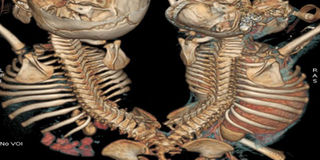World watches as Tanzanian twins undergo rare surgery

A medical illustration shows a fused lower spine in conjoined twins – which is quite common in recorded cases of pygopagus twins. PHOTO | FILE
What you need to know:
- A 20-strong team of specialists and surgeons will try to separate the spine, anus, rectum, penis and urethrais of the twins in the Sh103m operation.
Dar es Salaam. Indian doctors are on the brink of a major surgical milestone should they successfully separate a rare type of conjoined twins from Tanzania.
The 20-strong team of specialists and surgeons is lined up to carry out the 16-hour operation on the twin boys born to Tanzanian parents from Dodoma region. The operation will cost some Sh103 million.
The case has elicited considerable excitement not only in India, which is famous for its medical tourism, but also across the global medical fraternity--which will have an opportunity to watch the delicate surgical operation live on the Internet.
It will be India’s first attempt at separating babies joined at the tail end of their spines, scientifically described as pygopagus twins.
This category accounts for just 17 per cent of the conjoined twin population in the world.
According to Dr Venkat Sripathi, a senior consultant urologist at Apollo Hospitals, the surgery will involve separating the spine, anus, rectum, penis and urethra.
He added: “They have a single anus, urinary passage and rectum. Their penises were fused. It was unlike anything we have seen before.”
When doctors at the hospital pored over similar cases, they were confronted with the rarity of the condition. Of the 30 sets of pygopagus twins reported worldwide, 26 were female and only four were male.
The nine-month old twins, Ericana and Eluidi, are fifth in the known global list and will, for the first time on Tuesday, be able to look at each other in the eye if the doctors have their way.
The little ones and their mother have been admitted for the past five months at the Apollo Hospitals’ Vanagaram branch, where upbeat doctors will attempt the feat that could boost their reputation.
The twins were first admitted to hospital in their third month. Their mother can only pray and hope for the best--which is to return to Tanzania with her bubbling twins.
Said Dr Sripathi: “The twins were admitted in Tanzania for three months. After a lot of discussion, doctors told the mother that the separation of the babies was fraught with risk.
Health officials from the country sought our help and we decided to take up the case.
“In India, a few hospitals have successfully separated female pygopagus twins, but we found practically nothing on separating males. Separating males is a lot more challenging as in females the vagina and urinary passage are often separate, unlike in males.”
The surgery will take 14 to 16 hours and the team will comprise 20 senior specialists in neurosurgery, plastic surgery, paediatric surgery and paediatric urology.
Said Plastic Surgeon Roshini Gopinathan: “The babies have already undergone six procedures ahead of the surgery, including MRI and CT scans.”
“Over the past five months, we’ve also inserted tissue expanders in the back, buttocks and thighs so that skin flaps can be rotated to cover the large defects left after separation, After the surgery, plastic surgeons will reconstruct the raw areas in both babies and work on them separately.”
Dr Sripathi acknowledges that the risks are huge but remains confident that the doctors can carry out the procedure.
“The survival percentage post-surgery is around 80 per cent. Post-operative care is also critical. We’ve asked the parents to bring the babies back after six months for a follow-up and to do minor cosmetic work.”
The Tanzanian government will reportedly foot the bill.




